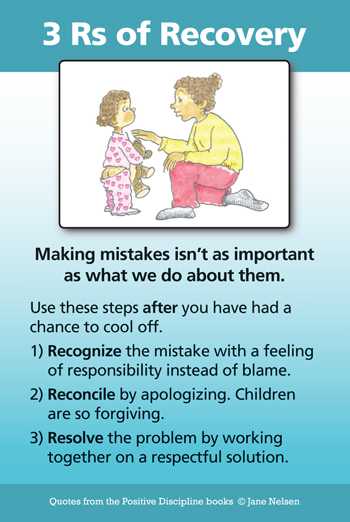“Errors divide men, but their correction is a means of union. It becomes a matter of general interest to correct errors wherever they may be found. The error itself becomes interesting. It becomes a link, and is certainly a bond of fellowship between human beings. It helps especially to bring harmony between children and adults. To detect some small error in a grown-up person does not produce lack of respect in the child or a loss of dignity in the grownup. The error becomes impersonal and is then amenable to control. In this way, small things lead to great.” (Maria Montessori, The Absorbent Mind, Page 250-251).
Teaching Children to Make Amends
Mistakes are an opportunity to learn. The Latin derivation of the word amend is emendare, which means to correct. Making amends means correcting mistakes. The word apology is most frequently defined as an expression of regret, or an admission of error (http://www.merriam-webster.com/dictionary/apology). Interestingly, this is the second definition in the Merriam Webster dictionary. The first definition is “a formal justification” or “an excuse”.
Most children today, are taught to apologize at home. They are forced to express their regret, even when they don’t regret their actions. This teaches manipulation skills, and does nothing to actually rectify a mistake. As a matter of fact, it often makes the problem worse because the offended student understands that the offender is not sorry for her mistake. In addition, when children and adults apologize, they follow the apology with an excuse for their behavior. “I’m sorry that I yelled at you. I had a hard morning, and didn’t get enough sleep.” How might you feel about receiving such an apology? What might you be thinking? Maybe, “That’s nice. Does that give you permission to yell at me?”
An apology, without an excuse, is certainly appropriate at times. There are sometimes that we can’t repair a mistake. If I share information that I should have kept to myself, there is no way to repair that. The information is out there. I can offer an apology though, and express my regret, and acknowledge my mistake honestly.
Mistakes require that we make amends where possible, and at least apologize, without an excuse, when amends are not possible. The Three R’s of Recovery are a concrete way to repair mistakes and improve relationships. When students learn to make amends, and repair relationships, those relationships can often get stronger than they were before the mistake.
When teacher’s model making amends with students when they make mistakes it sends a powerful message – It’s OK to make mistakes! It builds trust and connection between the teacher and the children, and fosters trust and a willingness to take responsibility without shame. Teaching children to make amends helps them build lifelong social and relationship skills and deepen their connection with others.
The Three R’s of Recovery
- Recognize the mistake with a feeling of responsibility without blame or excuses.
“I yelled at you in circle today.”
“I pushed you down the slide.”
“I stole your pencil today when you went to the bathroom.”
“I didn’t include you in our game.”
- Reconcile by expressing understanding of hurt feelings, and letting the other person know that they didn’t deserve the hurt. Apologize.
“That must have embarrassed you. I am sorry.”
“That must have really hurt.”
“You didn’t deserve that.”
“I would have been really mad too, if I were you. I am sorry.”
“I bet you felt left out.”
- Resolve the problem, when possible, by working together on a solution or asking what it will take to make things right, or simply asking for forgiveness.
“What can I do to make this right?”
“Would you forgive me?”
“Can I help you get an ice pack?”
“Here, I bought a new pencil for you. Would you like some help finishing the work that you couldn’t get done?”
“Would you be willing to work on some solutions with me?”
Here’s an example of a child making amends to another child:
“Francis, I teased you on the playground earlier, and I saw you crying. I know I hurt your feelings. What can I do to fix this?”
Teaching children to make amends empowers them with lifelong social skills. When children (and adults too) make amends effectively, they build acceptance and connection with one another. When children feel accepted and connected they are meeting their most basic human social need, and the need to misbehave, or attain acceptance in an ineffective way, dissipates.
Making Amends with Children
One of the most common mistakes that adults make when making amends with children, is that they offer excuses for their behavior. I don’t believe that adults do this because their intentions are bad. I think adults give excuses for their behavior because they want the child to know it’s not their fault. However, when people give excuses for their behavior, no matter what their intent, the amends or apology comes across as hollow, and more about the person making amends than the person who was hurt.
Here’s an example of making amends, with and without an excuse. Pretend for a moment that you were the one hurt, and were receiving these two messages.
“I am so sorry that I snapped at you in circle. Our baby was up all night, and I am cranky this morning, and it wasn’t your fault.”
“This morning I snapped at you in circle. You must have felt embarrassed and hurt. You didn’t deserve that. Would you forgive me?”
Which message would you rather receive? Which message would help rebuild the relationship?
Adults make mistakes all the time, with children. I make mistakes all the time with children. I have been working with children for a long time in Montessori schools. I still make mistakes. I can still be harsh, inconsistent, permissive, impatient, and many other adjectives. I make far fewer mistakes than I did as a young teacher, but I still make them.
Mistakes are an opportunity to learn. They are also an opportunity to grow; and to grow stronger than before the mistake was made. When a human bone healed, after being broken, it is stronger than it was before the break. Many of us have had this experience with other adults. We make a mistake. We hurt someone else. We make amends; and the relationship is stronger than it was before the mistake. It’s amazing!
Before learning about The Three R’s of Recovery, too often I would go home with feelings of guilt and remorse for having lost my patience with a child in my classroom. The next day I often found myself either overly remorseful or in denial. Most of the time I would feel remorseful, and instead of making amends I would become permissive in an unconscious attempt to repair hurt feelings or misunderstanding. Then I would likely lose my patience again with the child, because my permissive behavior would invite misbehavior in them. Sometimes, if I had an ongoing struggle with a student I would go into denial about my behavior, making excuses for it because of the ongoing nature of the child’s behavior. This behavior, on my part, created a power struggle, which also invited more misbehavior from the student.
When I learned about making amends with students, my relationships with the students began to change. There was a lightness, and a respect that wasn’t there before. Lightness, because I was building trust with the students by taking responsibility, and I was also modeling that it was OK to make mistakes. If adults can make mistakes and take responsibility, why can students? Mutual respect between the students and I began to increase, as well. Children don’t often hear adults taking responsibility, without excuses or blame. It is a refreshing experience, and one that builds respect, even though adults often fear that revealing their imperfections will erode respect. Imagine if a politician stood up and said, “I was wrong. Here’s why________. And, here’s what I intend to do to repair my error___________.”?
OK, that’s as far as I want to stray into political matters!
Suggestions for Making Amends for Adults and Children
- Cool down before you make amends.
- Avoid, at all costs, mentioning what the other person did. Trust them to take responsibility on their own.
- If you tend to be an over-apologizer (apologizing for everything, even if you’re not sorry), then make sure that you only make amends where you are sorry for your actions.
- If you tend to be an under-apologizer (rarely offering an apology or an amends), learn to trust the empathy and forgiveness of others. It’s OK to make mistakes.
- Always start off with what you did to cause hurt feelings. If you do say, “I’m sorry,” say it at the end.
Until next time…

Source: Nelsen, Jane. Positive Discipline: The Classic Guide to Helping Children Develop Self-Discipline, Responsibility, Cooperation, and Problem-Solving Skills. United Kingdom, Random House Publishing Group, 2011.
Source: Nelsen, Jane; DeLorenzo, Chip. Positive Discipline in the Montessori Classroom. U.S.A., Parent Child Press, 2021



